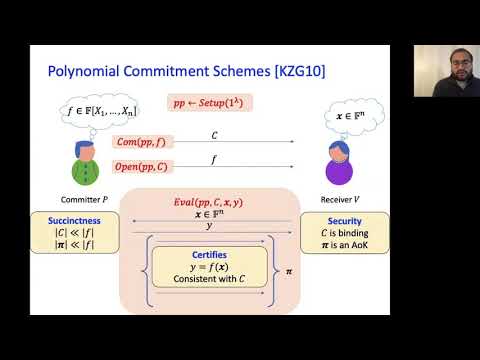CryptoDB
Public-Coin Zero-Knowledge Arguments with (almost) Minimal Time and Space Overheads
| Authors: | |
|---|---|
| Download: | |
| Abstract: | Zero-knowledge protocols enable the truth of a mathematical statement to be certified by a verifier without revealing any other information. Such protocols are a cornerstone of modern cryptography and recently are becoming more and more practical. However, a major bottleneck in deployment is the efficiency of the prover and, in particular, the space-efficiency of the protocol. For every $\mathsf{NP}$ relation that can be verified in time $T$ and space $S$, we construct a public-coin zero-knowledge argument in which the prover runs in time $T \cdot \mathrm{polylog}(T)$ and space $S \cdot \mathrm{polylog}(T)$. Our proofs have length $\mathrm{polylog}(T)$ and the verifier runs in time $T \cdot \mathrm{polylog}(T)$ (and space $\mathrm{polylog}(T)$). Our scheme is in the random oracle model and relies on the hardness of discrete log in prime-order groups. Our main technical contribution is a new space efficient \emph{polynomial commitment scheme} for multi-linear polynomials. Recall that in such a scheme, a sender commits to a given multi-linear polynomial $P:\mathbb{F}^n \to \mathbb{F}$ so that later on it can prove to a receiver statements of the form ``$P(x)=y$''. In our scheme, which builds on commitments schemes of Bootle et al. (Eurocrypt 2016) and B{\"u}nz et al. (S\&P 2018), we assume that the sender is given multi-pass streaming access to the evaluations of $P$ on the Boolean hypercube and we show how to implement both the sender and receiver in roughly time $2^n$ and space $n$ and with communication complexity roughly $n$. |
Video from TCC 2020
BibTeX
@article{tcc-2020-30645,
title={Public-Coin Zero-Knowledge Arguments with (almost) Minimal Time and Space Overheads},
booktitle={Theory of Cryptography},
publisher={Springer},
author={Alexander R. Block and Justin Holmgren and Alon Rosen and Ron D. Rothblum and Pratik Soni},
year=2020
}

